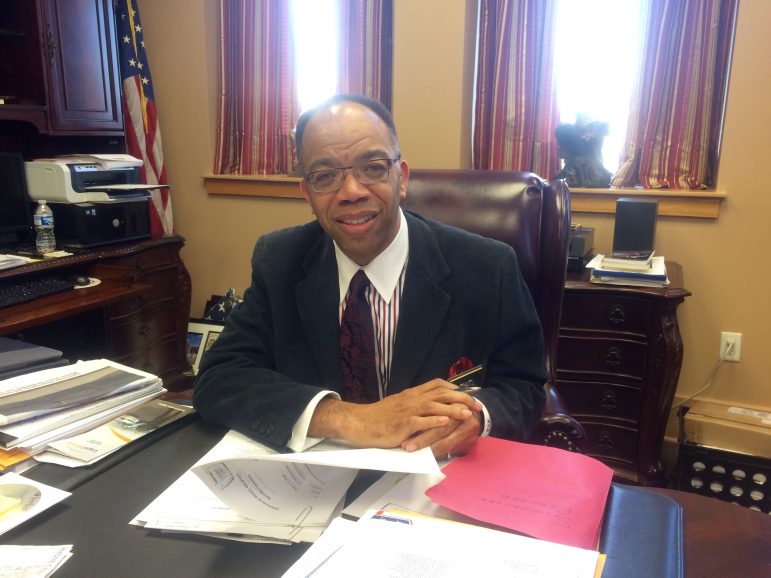Birmingham finished 2015 with the highest number of homicides since 2008, a dramatic 55 percent increase over last year. That has city leaders worried and pledging to put an emphasis on combating gun violence in 2016. According to Birmingham Police Chief A.C. Roper, Birmingham has also seen a rise in violent crimes committed by young offenders.
Homicides Increased in the Last Quarter of 2015
“This happened all over the nation,” says Roper. “I’ve spoken to chiefs nationally and we’re all wrestling with this problem of what occurred over the last half of the year.” Cities such as Baltimore, Chicago, New Orleans and Milwaukee have also seen increases.
“The month that it really hit was October,” says Roper. “In September we had three criminal homicides, and then we went to double digits in October. And it was like ‘what is going on all of a sudden?'” Roper says his team analyzed the homicides to see if they were related, but determined they weren’t.
“From our perspective, we just saw an intensity and increase in the typical homicides, if I can use that term. In other words, quite often risky people involved in risky activities at risky locations,” Roper says. “We saw very few homicides involving people who were just going to work minding their business.”
The Causes: Drugs, Guns and Domestic Violence
According to Roper, most of Birmingham’s criminal homicides in the latter part of the year centered around the drug trade. It’s what police call “a drug deal that goes bad, some type of domestic violence situation, or something like that,” says Roper.
“Some of those the police department can impact, but we recognize that quite often there are many out there that we can’t prevent because it’s people that know each other,” Roper says. “If you’re sitting in a living room with a friend and that friend shoots you, there’s not much strategy I can use as a police chief to prevent that,” says Roper.
But Roper says there is a lot the police department can do in 2016, and it starts with guns.
“Quite often we have people who have firearms who should not have them in the first place,” says Roper. “And of course there’s this national conversation about gun laws and gun rights and all of that. But it’s my officers that are standing out there on the street, standing by a dead body,” he says. “I believe in the Constitution. But we’ve got to do a better job, not just locally, but federally, when it comes to gun laws,” Roper explains.
Focus on the West Precinct
The second part of Roper’s 2016 strategy involves having a strong, visible presence in areas most impacted by violent crimes and homicides.
“What we’re trying to focus on are those activities and those places that lend themselves to criminal activity. We’re running quite a few operations on the western side of town, which is my largest precinct and my most challenging precinct,” says Roper. The 65-square-mile West Precinct is also home to most of the city’s homicides. According to the Birmingham Police Department, more than 80,000 people live in that precinct.
“What you’ll see this year is greater focus on that precinct, but you’ll also see greater partnerships,” says Roper. He says holistic community partnerships, especially with area churches, are the only ways to get to the root of the problem.
“We’re looking for a strategic, focused effort in that precinct. We can take two to three of our most challenged neighborhoods and do everything we can, not just from a law enforcement perspective, but from a socio-economic perspective, to improve the quality of life,” says Roper. “Let’s do that for a year and see what happens.”
The Birmingham Violence Reduction Initiative
Roper’s most hopeful about the Birmingham Violence Reduction Initiative, which rolled out in the latter part of 2015. For this initiative, Birmingham has partnered with John Jay College of Criminal Justice and David Kennedy, director of the National Network for Safe Communities.
Roper explains the BVRI is focused on targeting vulnerable groups for positive, preemptive interventions. “Statistics show that so many of our violent crimes, especially homicides, have a group dynamic,” says Roper. “What we have done is looked at the data for the last several years of homicides and shootings to identify who are the individuals who are the most likely to kill or are most likely to be killed,” Roper says. The police then conduct a call-in with those individuals.
“We call them in and we discuss this with them. We say ‘Listen, we want you alive. We want you safe. We want you out of prison. Because if you continue on this path, we’re going to arrest you and put you in prison probably for the rest of your life or you’re going to end up a homicide victim,'” says Roper. “And then we offer them services. We’ve partnered with UAB to offer all types of counseling and job skills training to try to help them get their lives on the right track.” Roper says this kind of hands-on approach has worked in other U.S. cities, such as Boston.
So far, Roper says about 20 young men have taken the Birmingham Police Department up on the offer.
“We want that to grow,” says Roper. “I would much rather these young men be employed than sitting in my jail.”

